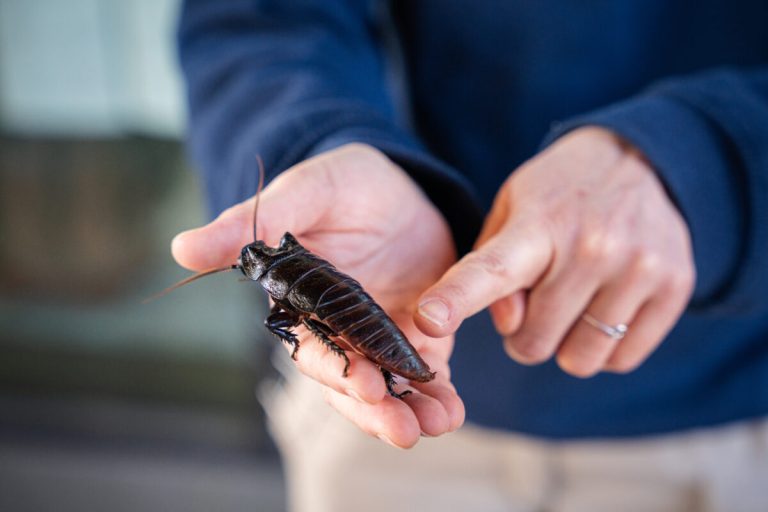Guide to Alabama’s 6 venomous snakes and how to react if you see one
Reading time: 5 minutes

Alabama is one of the most biologically diverse areas in the United States. Although we have 66 known species and subspecies of snakes, only 6 are venomous. Learn more about Alabama’s 6 venomous snakes and how to react if you encounter one in the wild.
Firstly, I have always been afraid of snakes. Although I’ve never had a bad experience with them, seeing one sent shivers down my spine. However, after a trip to the Ruffner Mountain Nature Center, I learned that my fear is based on a lifetime of misconceptions. Therefore, I tried to learn more about these creatures. Here are just a few of the facts I learned.
“Alabamians are so lucky to have the amount of snakes and biodiversity that we do.
Chivon Morse, Operations Manager/Wildlife Curator
1) Copperhead – Agkistrodon contortrix

- Status: Lowest conservation concern
- Range in Alabama: Common statewide
- Fun fact: Since copperhead venom dissolves tissue, researchers are working on synthesizing the protein in the venom in order to fight cancer.
2) Cottonmouth – Agkistrodon piscivorus

- Status: Lowest conservation concern
- Also known as: Water moccasin
- Range in Alabama: Common throughout the state
- Fun fact: Cottonmouths are the only venomous semi-aquatic snake in North America.
3) Coral Snake – Micrurus fulvius

- Status: Highest conservation concern
- Range in Alabama: Along the coast of Southern Alabama
- (Not so) Fun fact: In the past 32 years, there have only been 4 documented sightings of a coral snake in Alabama.
4) Timber Rattlesnake – Crotalus horridus

- Status: Lowest conservation concern
- Also known as: Banded rattlesnake, buzz-tail, velvet-tailed rattler, canebrake
- Range in Alabama: Common statewide
- Fun fact: Benjamin Franklin admired the Timber Rattlesnake and saw it as a symbol of America.
Additionally, studies suggest that environments with Timber Rattlesnakes have reduced tick populations. Since Timber Rattlesnakes prey upon the rodents that carry ticks, these environments usually have less ticks.
5) Pigmy Rattlesnake – Sistrurus miliarius

- Status: Moderate conservation concern
- Also known as: Pygmy rattlesnake, ground rattler
- Range in Alabama: Northern third of Alabama, western part of central Alabama, and the lower coast
- Fun fact: Since pigmy rattlesnakes (and other pit vipers) are ambush predators, they can wait in the same spot for up to 3 weeks for prey to come by!
6) Eastern Diamondback Rattlesnake – Crotalus adamanteus

- Status: High conservation concern
- Range in Alabama: Southern Alabama
- Fun fact: Since the Eastern Diamondback Rattlesnake can reach lengths close to seven feet, it is the largest species of rattlesnake in the world.
How to react if you encounter one of these snakes in the wild

“There is always a better way to get rid of the snake than killing it. Putting yourself in a position to kill a snake is THE most dangerous thing that you could do.”
Aaron Hathcock, Animal Husbandry
As long as you know how to react, an encounter with one of Alabama’s 6 venomous snakes is not necessarily dangerous.
- During walks in the woods, wear closed-toe shoes and long pants .
- Additionally, look 3 to 5 feet ahead of you to avoid accidentally stepping on a snake.
- Don’t put your hands or feet anywhere that you cannot fully see. Avoid sticking your hands in rocky outcroppings, piles of brush, or under tree stumps.
- If you encounter a snake that might be venomous, slowly walk away.

Additionally, if you find a snake on your property–ask yourself why the snake is there. More than likely, your property is prime real estate to snakes. Here are a couple of tips to make your yard less ideal for snakes.
- Keep your lawn mowed and cleared of brush and branches.
- Don’t leave pet food outside. Pet food attracts rodents, which then attracts snakes.
What to do if you are bitten by a snake

If you are bitten by a snake, immediately call 911 or the Poison Control Center at 1-800-222-1222.
According to the Center for Disease Control, there are roughly 8,000 recorded snake bites in the United States every year. However, only about five end up being fatal. As long as you seek immediate medical attention, a snakebite is not a death sentence.
DO…
- …call 911 or go to the hospital immediately
- …keep calm
- …remove rings, jewelry, socks, or restrictive clothing
DO NOT…
- …suck the venom: Since venom travels through the lymphatic system and not the bloodstream, this will not stop the venom from traveling through your body.
- …put on a tourniquet or apply ice to the wound
- …cut around the wound
- …attempt to capture the snake

Want to learn even more about Alabama’s snakes? Pick up a copy of Lizard and Snakes of Alabama.

 102741 views
102741 views
